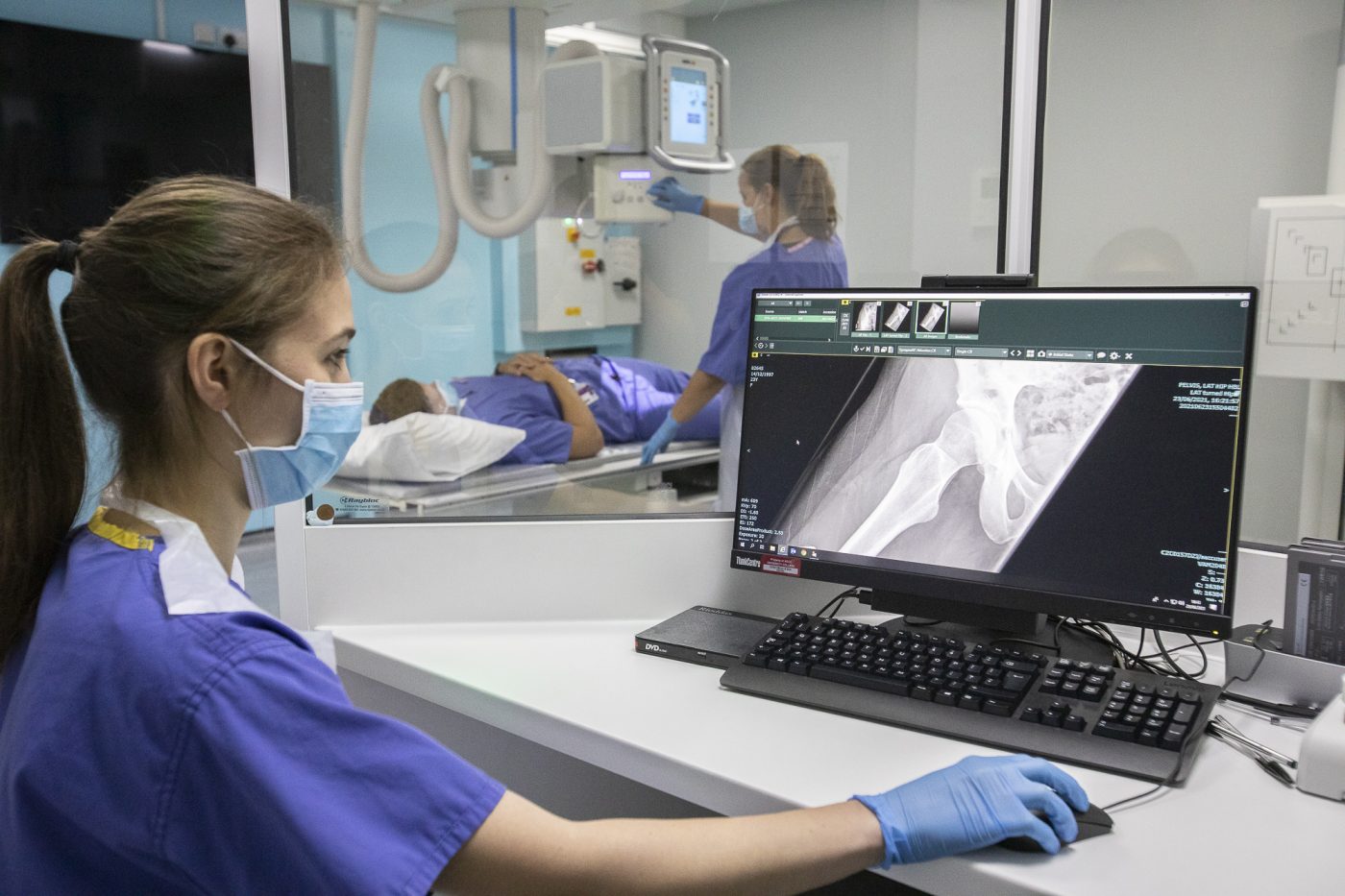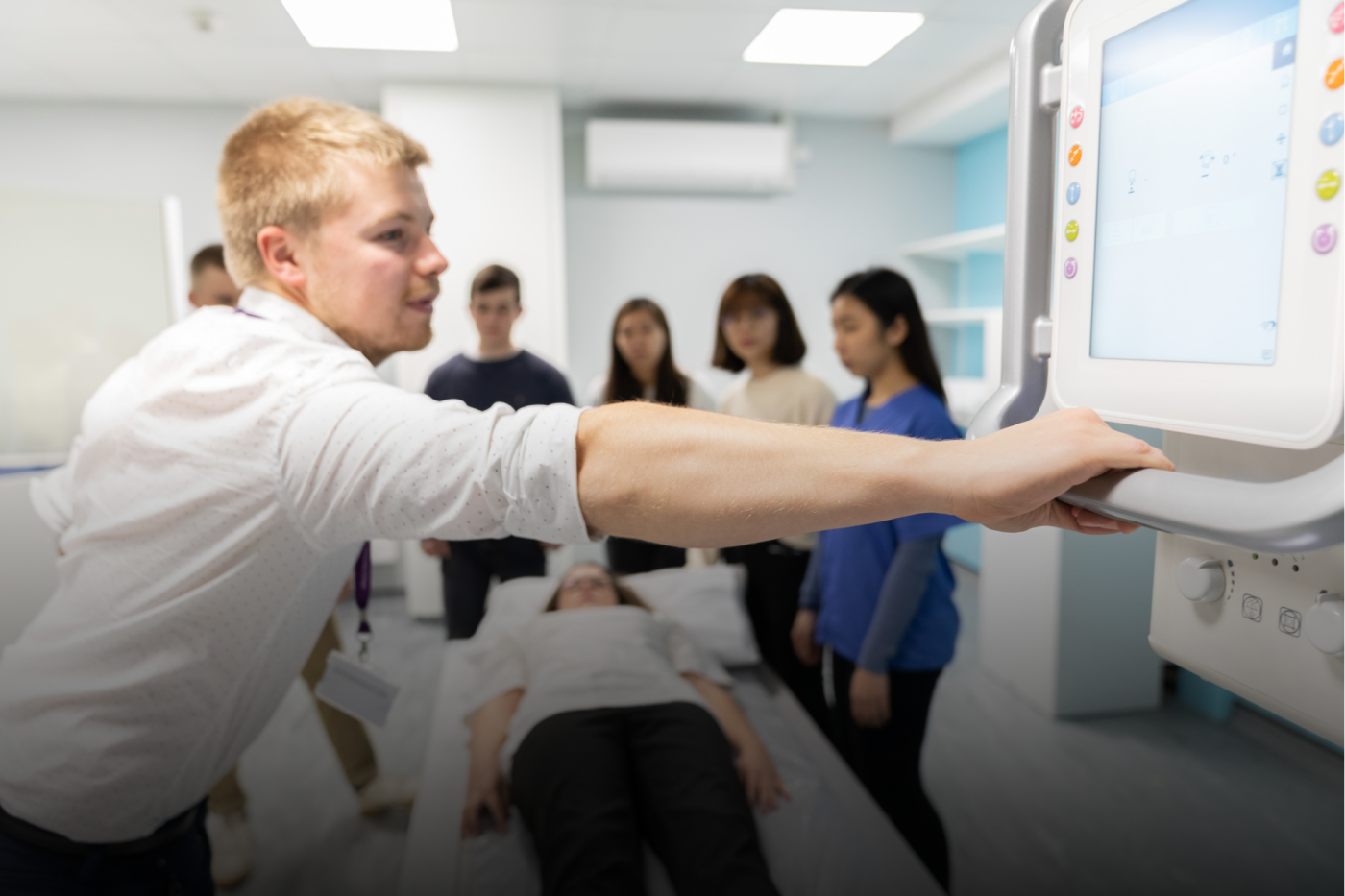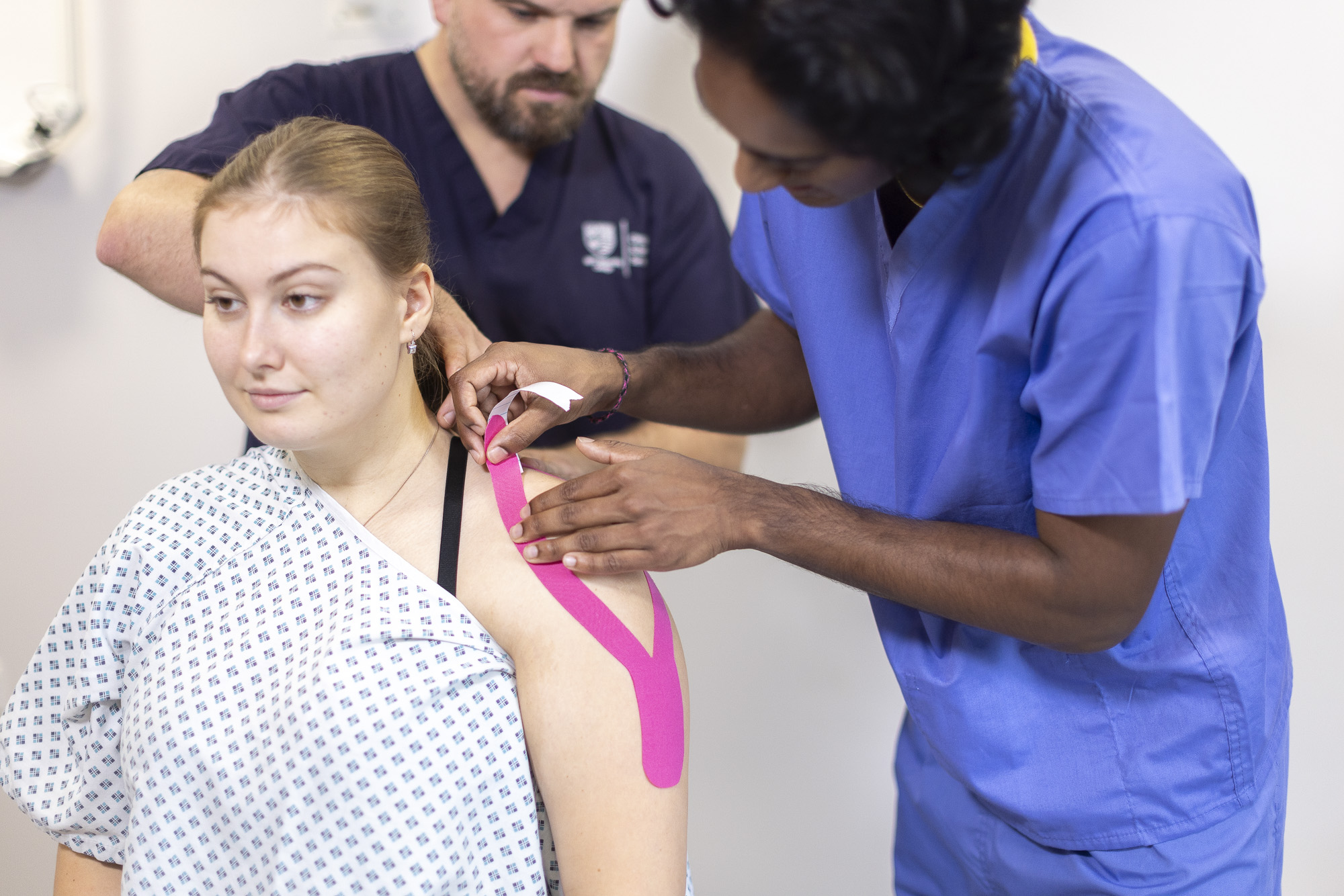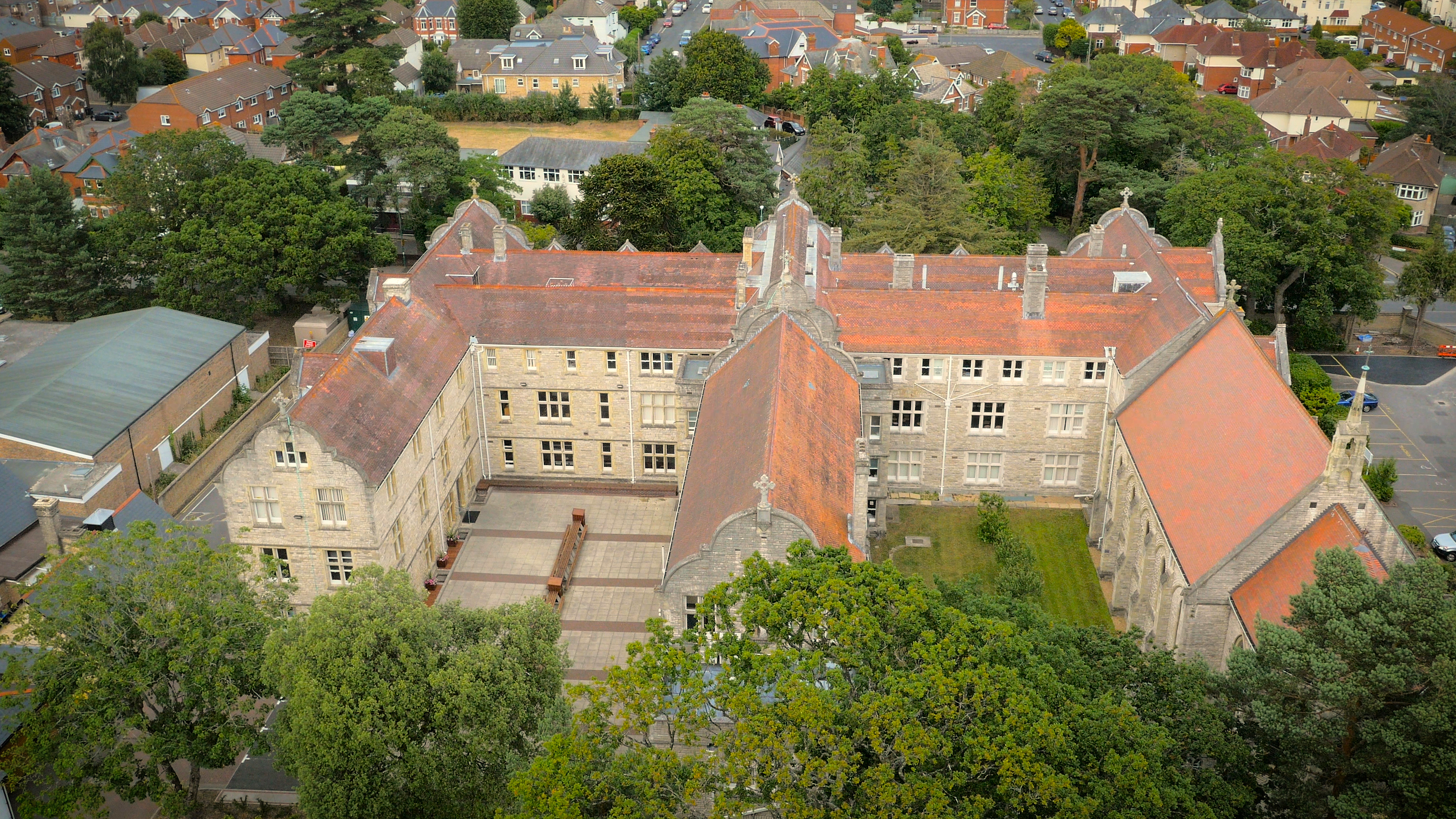Overview
Diagnostic radiographers are regulated professionals with the Health and Care Professions Council (HCPC). The title Diagnostic Radiographer is a protected title that only those on the professional register can use.
Diagnostic Radiographers are involved in obtaining medical images of bones and soft tissues to assess and diagnose abnormalities. This is done using a range of complex imaging equipment. This includes imaging using X-rays and cross-sectional imaging methods (Computed Tomography or CT scans), ultrasound, Magnetic Resonance Imaging (MRI), Mammography, Angiography and Nuclear Medicine.
Diagnostic Radiographers work with a broad range of service users. They work independently to assess, authorise, obtain consent and undertake individual examination requests for diagnostic radiography procedures. They evaluate those images and determine appropriate next actions.
In their daily work, a diagnostic radiographer interacts with service users, their carers, members of the public and other healthcare staff e.g. porters, nurses, other allied health professionals, doctors, external contractors, engineers and medical physicists etc. This could include for example working alongside a surgeon in an operating theatre or using mobile equipment in A & E to assess a trauma patient.
Diagnostic radiographers are responsible for safely using imaging equipment and conducting examinations, a sound knowledge of the dangers of radiation and how to use radiation safely is vital to ensure the radiographer can protect themselves, the public, colleagues and the patient.
This diagnostic radiography apprenticeship has been developed to offer a pre-registration route to professional registration as a radiographer.
The apprenticeship has been developed in association with a range of stakeholders including with local healthcare providers and service users. Its development recognises the demand locally, regionally and nationally to grow the existing radiography workforce.
This apprenticeship programme offers you an exciting opportunity to train for professional registration, with the support of an employer, whilst earning a salary. On average the off the job learning time (excluding your practice-based learning placements) would be two days per week.
The course is offered via blended learning. This means you will attend a mixture of face-to-face sessions, many of these will be conducted online. Most weeks your face-to-face sessions will all be delivered on one day. The other day you would be involved in asynchronous activities and independent learning, preparing for assessments etc. These asynchronous and independent learning hours can be done at a time that is convenient for your employer.
Some of the face to face sessions will require you to attend the HSU campus. Where possible, we have grouped on-campus activities, to reduce travel and over-night accommodation costs.
Over the three years, you will also undertake mandatory practice-based learning hours. These will be undertaken in a variety of settings for example in our on-site clinics, and in the NHS.
In addition, tri-partite reviews, to support your progress, will be held four times a year between the apprentice, apprenticeship tutor, and workplace supervisor. These meetings are designed to support your progress through the apprenticeship.
The course is designed to align to the requirements of:
- the apprenticeship standard for diagnostic radiographers from the Institute for Apprentices and Technical Education (IfATE);
- the standards of proficiency of the regulator of the profession, the Health and Care Professions Council (HCPC).
- The education and career framework of the professional body, the College of Radiographers(CoR).
This means on successful completion you would be eligible to join the professional register and become a full member of the professional body.
Who is this course for?
To join the diagnostic radiography apprenticeship, you will need to be working in a suitable role for at least 30 hours per week and have the support of your employer. If you would like to become a diagnostic radiographer via the apprenticeship route, you will need to apply for an apprenticeship role with an employer.
Employers advertise degree apprenticeships throughout the year. You cannot apply directly to the University for a degree apprenticeship, please register your interest below and request an Expression of Interest form, and we will seek to advise you further.
Vacancies for apprenticeship roles can also be found on the NHS Jobs website. You will need to check there regularly.
If you are an employer and are considering supporting one of your team to complete the apprenticeship, please register your interest below and request an Expression of Interest form, and we will seek to advise you further.
How is this course structured?
The course runs over a three-year period, where you will study part-time, alongside working for your employer.
Through a combination of academic study; hands-on practice-based learning in clinical settings and mentorship, you will develop a comprehensive understanding of knowledge, skills and values required of a diagnostic radiographer. You will learn how to work under pressure and to make important decision in pressured environments. You will develop your ability to think critically and analytically, and you will become a resilient, reflective and empathetic practitioner.
Under the guidance of mentors and educators you will have the opportunity to apply theoretical concepts in practice with service users from various backgrounds, and to collaborate with interdisciplinary healthcare teams to deliver excellent diagnostic imaging services.
For each unit you will have a number of off-the-job learning hours, this refers to the indicative protected learning time designed and planned for a typical apprentice to achieve the level of competence required to successfully achieve this apprenticeship.
Off-the-job learning will include: learner contact time (on campus face-to-face, live online learning), tutor-guided learning, workplace planned learning hours, and independent study for you to extend your learning and prepare for assessments.
During the course you will benefit from access to high quality teaching facilities at HSU including:
- Highly skilled academic and clinical staff
- Ultrasound machines,
- MRI scanner,
- Digital X-Ray suite
- Simulation kit including an AI enabled simulated ward environment.
This ensures you will be well prepared to undertake the practice-based learning with our NHS partners.
Please note: This course is subject to validation
Course Details
The course is delivered across three trimesters each year and the programme takes three years to complete.
Your academic studies include theoretical subjects which underpin diagnostic radiography practice, including the study of anatomy, principles of radiation and imaging, research, audit and service improvement and how to support excellent service-user centred care for people with diverse needs. You will also develop a strong understanding of what it means to be a registered professional.
The units also align to the four pillars of practice of: Clinical practice, Management and Leadership, Education and Research and Development. This ensures you will be ready to start your career and have a framework for your further professional development.
You will undertake practice-based learning which allows you to consolidate your academic learning and develop the knowledge, skills and behaviours required to become a reflective autonomous practitioner. This practice-based learning will take place in diagnostic imaging and radiology departments at local sites across the region.
Some of your units will be studied alongside apprentices from other allied health professions, namely occupational therapy, podiatry and speech and language therapy. Together you will undertake units that cover some key concepts common to all AHP professions such as professionalism, leadership, communication skills and health behaviour. You will also learn the skills to undertake research and quality improvement initiatives to enhance and improve practise in your chosen profession. These units will have some shared sessions but also profession specific sessions where appropriate.
Over the course of the three years, you will study units that will develop radiography specific knowledge and skills to allow you to undertake radiographic procedures in a safe, effective and competent manner. You will become a reflective practitioner, able to critique and reflect upon your clinical practice decisions, monitor and review interventions allowing you to modify care and instigate change to improve the service as necessary.
You’ll be assessed through a combination of assessment methods, that may include:
- Written reports and essays
- Presentations
- Practical activities
- Online examinations
- Portfolio of Evidence
To be able to apply for this course you must already be employed in a suitable clinical area that will support your apprenticeship.
It may be possible to undertake some of your placement/practice-based learning hours within the organisation where you are employed. However, to ensure you cover the entire scope of practice for diagnostic radiographers and that you experience different working environments, you will be required to undertake practice-based learning hours in a number of settings.
You will need to be working a minimum of 30hrs per week. Your employer is required to support your off-the job development time, this time may be spent attending classes at the University or online or on a placement or undertaking self-directed study.
Additional Information
During the course you will benefit from access to high quality teaching facilities at HSU including:
- Highly skilled academic and clinical staff
- Ultrasound machines
- MRI scanner
- Digital X-Ray suite
- Simulation kit including an AI enabled simulated ward environment.
This ensures you will be well prepared to undertake the practice-based learning with our NHS partners.
The College of Radiographers has published an education and career framework for radiographers, which provides guidance for the career progression for the profession. The opportunities for development include: enhanced practitioner, advanced practitioner, consultant practitioner, service management and leadership, practice educator, research and academic roles.
Entry Requirements
What qualifications do I need? 
- Learners must have GCSE pass (A-C or 4-9) English and Maths or equivalent e.g. level 2 functional skills in English and Maths. AND
- Level 5 qualification i.e. FdSc Assistant Practitioner OR
- Three A Levels BBC or above OR
- BTEC: DMM or above . OR
- Access to HE Diploma: A total of 112-120 UCAS points in a relevant Access to HE Diploma OR
- International Baccalaureate: Overall grade of 30-32 points or higher l. OR
- T Level: Merit .
Anything Else Needed 
Is there anything else that is required?
In addition, apprenticeship funding comes with the following requirements:
- You must be employed for a minimum of 30 hours per week, at least 50% of these hours must be working in England.
- Your employment must be linked to this apprenticeship course.
- You must have resided in the UK for a minimum of 3 years.
- You must be eligible for apprenticeship funding through your employer.
- You must not be enrolled on another apprenticeship.
International registrants who are employed and have relevant visas can access apprenticeship programmes, please see the international section for information on the English language required for this programme.
If you’re not sure about anything listed here, talk to our Apprenticeship team by emailing apprenticeships@aecc.ac.uk complete the form below or call us on 01202 436200 and we’ll be happy to answer any question you have.
International 
For further information on English language requirements, please see the dedicated English language requirements page.
More information on permission to study in the UK can be found on our Visas and immigration page.
For more information about our admissions policies and procedures, including our Admissions Complaints and Appeals Policy, please see our latest policies.
Please note to be accepted onto this course; you will also need to demonstrate that you meet the minimum standards of English. For this course, the HCPC Standards of Proficiency suggest that for entry into Diagnostic Radiography must: ‘Be able to communicate in English to the standard equivalent to level 7 of the International English Language Testing System, with no element below 6.5. Applicants are required to achieve the equivalent of an IELTS (academic) score of 7.0 or above with no less than 6.5 in each section.
Evidence of prior learning 
At interview you will undertake a skills scan, where relevant prior academic learning and experience relevant to the course learning outcomes, will be identified. Consideration will be given to recognition of this prior learning. Prior learning will be reviewed to ensure it meets the learning needs of the course and meets the learning outcomes of any units where exemption is requested.
Register your interest 
Register your interest
To register your interest now or ask any questions about the course, please complete the form at the bottom of the page.
Still have questions about applying?
Course Fees
Diagnostic radiography – This apprenticeship has been allocated to the £24,000 funding band
Register your Interest

Why choose Health Sciences University
There are many benefits to studying at Health Sciences University, from our expertise and history in teaching health sciences, to our state-of-the-art facilities, on-site clinical training, and of course our location on the beautiful Bournemouth coast.



